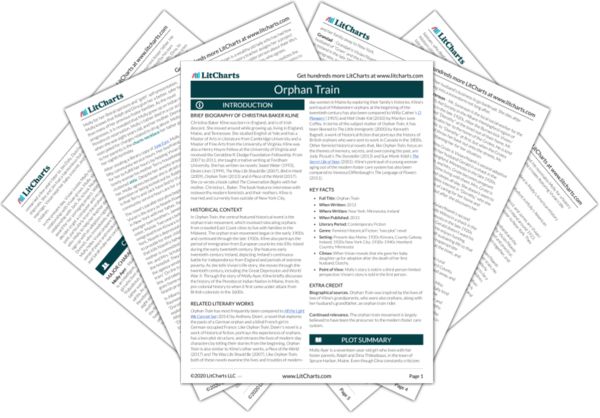Summary
Analysis
Mr. Grote’s hunting isn’t going well and there is a shortage of food. One day, he tries to figure out the worth of Niamh’s claddagh cross, but Niamh convinces him that her necklace is made of tin and worth nothing. She remarks that Mr. Grote talks to her “all the time.” He tells her how his brother killed his father and how he ran away from home. He tells her that he and Mrs. Grote married after having several children on accident, and that he would rather spend his life hunting than raising children. He says he doesn’t love his wife, and that she doesn’t talk to him anymore. He says she loves sex but that she disgusts him, and that he wishes he’d found a girl like Niamh who wouldn’t have “trapped him.” Niamh “knows he shouldn’t be talking to [her] like this” because she’s “only ten.”
Mr. Grote’s predatory interest seems to develop (or reveal itself) gradually. At first he tells Niamh about his family, which seems innocent enough. He then begins telling her things that aren’t appropriate to tell a child. By the time he tells her about his sex life, he has crossed the line into treating her like an adult woman. Niamh’s feelings reflect her instinctive awareness that something is unsafe about the situation. Mr. Grote’s attention signals that he is exploiting Niamh’s powerlessness as a child under his care. He also seems to have projected his disappointment in his life onto Niamh.
Themes
Niamh notices that the children “whimper […] and cluster together” rather than playing like “normal kids.” Still, she finds herself unable to satisfy their unmet need for love because it “takes all [her energy]” just to get ready and go to school each day. Lying awake one night, Niamh remembers how her Da told her to imagine a happy place to get through a difficult time. She imagines the same place again now: Gram’s kitchen. In her memory, she pictures herself and Gram baking, singing, and sipping tea. But then other memories creep in: She remembers her Mam “expecting her” to cook, clean, and care for her siblings. She remembers one night when her Mam was crying and she went to hug her. Her Mam shook her off and accused her of being insincere. After that, Niamh felt “numb” and stopped “trusting” her. In response, her Mam called her “heartless.”
The children’s behavior indicates that they aren’t receiving the love, care, and protection they need in order to develop in a healthy way. Niamh is perceptive enough to realize the children’s needs, but she is only a child herself, and has her own trauma and unmet needs to manage. Her remark about school taking “all [her] energy” suggests that she is emotionally shut down because she is in survival mode. The memory of her mother relying on her parallels her current relationship to Mrs. Grote, and the story of her mother’s rejection show that Niamh’s feelings of detachment and distrust in adults began even before she was orphaned.
Themes
The Grotes’ children come down with lice. Niamh remembers her Mam’s stories of lice outbreaks at boarding school. Her Mam refused to cut her long, dark hair ever again and was careful to keep her children clean. Reluctantly, Niamh tells Mrs. Grote, who instantly accuses Niamh of bringing the lice. For hours, Niamh boils water and washes the sheets while Mrs. Grote sits and directs her. When Mr. Grote comes home, Niamh hears them argue, with Mrs. Grote yelling phrases like “dirty Irish bog-trotter.” Mr. Grote then comes out and starts helping Niamh. He shaves all the children’s heads, but only “gently” cuts Niamh’s hair short, insisting “it would be a crime” to shave her head. Niamh remembers how she was the only redhead in her family and how her family loved her hair. Mrs. Grote refuses to let anyone check her own head. Niamh spends days cleaning the house, feeling helpless and miserable.
Despite their troubled relationship, Niamh’s memory of how her Mam kept her children clean suggests that she took better care of her children than Niamh’s current guardians. Mrs. Grote’s assumption that Niamh brought the lice illustrates how her unwillingness to admit fault and her prejudiced beliefs cause her to treat Niamh extremely unfairly. Mr. Grote helps Niamh and doesn’t blame her, but given his predatory attention, it seems that his kindness is motivated by his attraction to Niamh, not feelings of parental care or kindness. Niamh’s memory of her family’s fondness for her hair suggests that her hair partly represents her connection to her country and family. Losing it means losing another link to her past.
Themes
When Niamh returns to school several days later, she hands Miss Larsen a note explaining that she was absent because of the lice. Miss Larsen “doesn’t give away a thing” and compliments “Dorothy” on her “new haircut.” She tells her she reminds her of flappers – “big city girls [who] go dancing and do what they please.” Miss Larsen smiles and tells Niamh, “Maybe that’s what you’ll become.”
Miss Larsen reacts kindly and discreetly to the news about Niamh’s lice, creating a safe environment for her. By addressing Niamh’s hair in a positive way, she gives other students the illusion that Niamh’s haircut was intentional. Her comments about Niamh’s future also suggest her open-mindedness.
Themes
Get the entire Orphan Train LitChart as a printable PDF.













